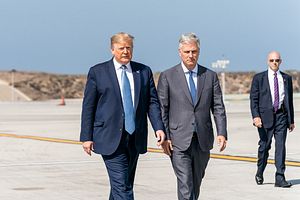It would be sad were it not so predictable. Shortly after North Korean leader Kim Jong Un broke a 22-day public absence only to be seen overseeing a major meeting of the Workers’ Party of Korea’s Central Military Commission, Robert C. O’Brien, the U.S. national security adviser, was interviewed on cable news and said that the United States would “keep talking” to North Korea.
Publicly reported talks between the two sides have not taken place since the early October 2019 collapse of the briefing working-level meeting in Stockholm. Certainly, 2020 has not featured any direct working-level contacts — beyond the letters exchanged directly between Trump and Kim. Stockholm, too, was less of a negotiation and more of a moment for the North Koreans to tell the Trump administration what they thought of the U.S. approach. In reality, U.S.-North Korea talks that had been moribund for months after the February 2019 Hanoi summit are now fully dead.
Where senior U.S. officials would often make reference to the “final, fully verified denuclearization of North Korea, as agreed to by Chairman Kim in Singapore,” there’s less to say today. O’Brien, sticking to the Trump administration’s talking points, did return to old Singapore Summit canard: “But ultimately, the North Koreans, if they want to reenter the world, if they want to have a great economy — and we hope they do, they are going to have to give up their nuclear program.”
Kim made his thoughts on that apparent at the recent Central Military Commission meeting, which devoted considerable attention to the country’s “nuclear war deterrent.” Even earlier, back at December’s 5th Plenary meeting of the 7th Central Committee of the Workers’ Party of Korea, Kim recentered nuclear weapons in North Korea’s national defense strategy and alluded to a “new strategic weapon” that would be unveiled in due time. His move to note an end to his April 2018 unilateral moratorium on nuclear testing and long-range missile testing has apparently gone unnoticed by the Trump administration, if O’Brien’s latest remarks are anything to go by.
O’Brien tried to defend the White House’s record on North Korea policy, noting that the administration “managed to avoid a conflict with North Korea over the last three and a half years,” and that Trump had “engaged in some excellent personal diplomacy with Kim Jong Un.” But these continue to miss the bigger picture: North Korea not only continues to possess nuclear weapons, but it continues to quantitatively expand its nuclear forces without inhibition or limit. Meanwhile, the Trump administration—potentially staring down its last seven months in office — has little new to offer.

































